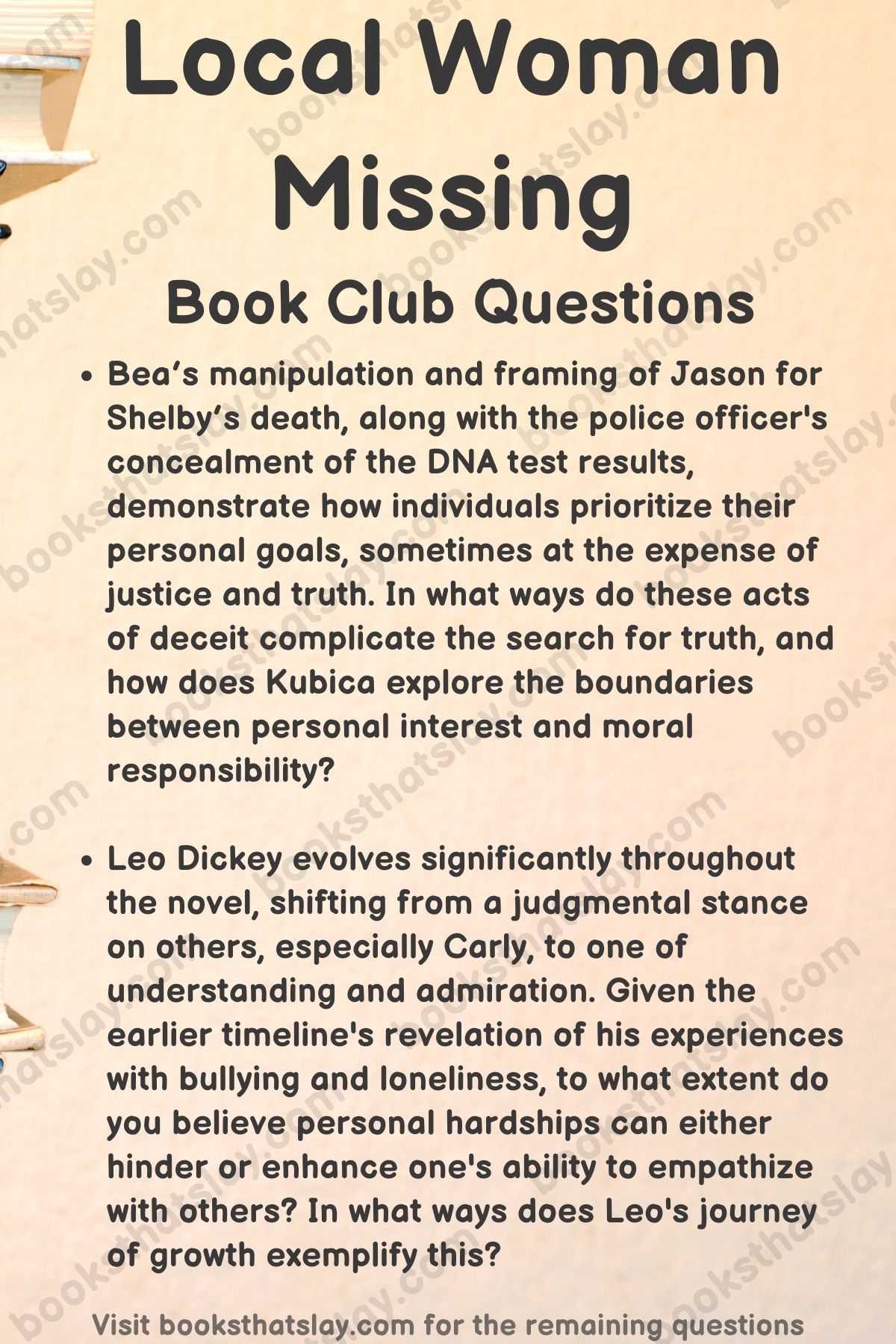10 Local Woman Missing Book Club Questions for Discussion
In Mary Kubica’s gripping thriller, “Local Woman Missing,” we are drawn into a world of secrets, betrayals, and raw human emotion set against the backdrop of a seemingly tranquil suburban setting. As each twist and turn unfolds, it becomes clear that this narrative is not just about missing persons but about deeper existential questions of identity, morality, and the human psyche.
For those who’ve been enthralled by the story’s layers and character arcs, it’s worth pausing and diving deeper into the underlying themes that give the tale its heartbeat.
In this discussion guide, we’ll explore some amazing book club questions for Local Woman Missing that aim to unearth the complex motifs and discussions sparked by this enthralling novel.
Whether you’ve just turned the last page or are revisiting the story for the nth time, join us in this introspective journey through Kubica’s suburban masterpiece.

Local Woman Missing Book Club Questions
- Kubica paints a picture of suburban life that is riddled with secrets, mistrust, and hidden relationships. This environment allows for significant events to occur right under the noses of neighbors and friends, creating an atmosphere of ignorance and paranoia.
How does this portrayal of suburban life challenge or reinforce our understanding of the complexities of close-knit communities, and how does it serve as a backdrop to the unfolding tragedies in the novel? - Meredith Dickey’s character is a study in moral complexity, particularly in the decisions she makes. She is driven by her desire to champion and protect vulnerable women, and yet her morality is tested when she, alongside Bea, runs over Shelby.
Given Meredith’s dedication to helping women in their moments of vulnerability, how does her decision to initially cover up the accident with Bea reflect the nuances of human nature and the pressure of situational ethics? - Bea’s manipulation and framing of Jason for Shelby’s death, along with the police officer’s concealment of the DNA test results, demonstrate how individuals prioritize their personal goals, sometimes at the expense of justice and truth.
In what ways do these acts of deceit complicate the search for truth, and how does Kubica explore the boundaries between personal interest and moral responsibility? - Kate’s character provides an ironic twist on the concept of fear and intuition. While she is wary of the construction workers renovating her home, she remains blissfully unaware of Bea’s sinister actions that occur under her own roof.
How does Kate’s misplaced fear and trust highlight the broader theme of perception versus reality, and what message might the author be conveying about our own biases and preconceptions? - Carly, after 11 years of captivity, is mistaken for Delilah and is thrust into a family that believes her to be their long-lost relative. This situation poses deep philosophical questions about identity, memory, and the human need for belonging.
Considering Carly’s experience and her eventual confrontation with her true identity, how does the novel delve into the complexities of self-awareness, acceptance, and the human need to find one’s place in the world? - Leo Dickey evolves significantly throughout the novel, shifting from a judgmental stance on others, especially Carly, to one of understanding and admiration.
Given the earlier timeline’s revelation of his experiences with bullying and loneliness, to what extent do you believe personal hardships can either hinder or enhance one’s ability to empathize with others? In what ways does Leo’s journey of growth exemplify this? - Meredith’s guilt after the accident with Shelby becomes a central point of tension, as it drives her actions and decisions, ultimately leading to her tragic fate. This guilt contrasts with Bea’s actions and apparent lack of remorse.
Given these character developments, how does the narrative probe the nuances of personal accountability, the internal battle with guilt, and the lengths one might go to seek redemption or avoidance? - Bea’s character is in stark contrast to Meredith and Kate in terms of her moral compass. She’s calculated, and even when faced with the consequences of her actions, she remains largely unrepentant, seeking to justify and preserve herself.
How does Bea’s consistency in her nature, even amidst the unraveling truths, underscore the novel’s exploration of inherent nature versus external pressures? Could Bea’s choices ever be rationalized or excused based on her personality or circumstances? - The Hanaka and Tebow families serve as mirrors to the Dickeys, shedding light on the facades that people often construct, either to project a perfect life or to hide their crumbling realities.
Considering the external pressures of society and community, how do these families exemplify the dangers of prioritizing appearances over authentic living? Do you believe the environment or the community played a significant role in the decisions and actions of these families? - The ending of the novel, while offering a semblance of justice, also hints at the irreparable scars and traumas left behind by Bea’s actions. Delilah’s captivity and Carly’s wrongful identity are just two of the significant traumatic events explored.
How does Kubica weave the theme of trauma throughout the story, and in what ways does the narrative address the long-term impacts of such traumas on individual psyches and familial relationships?
Read our discussion questions for other books: